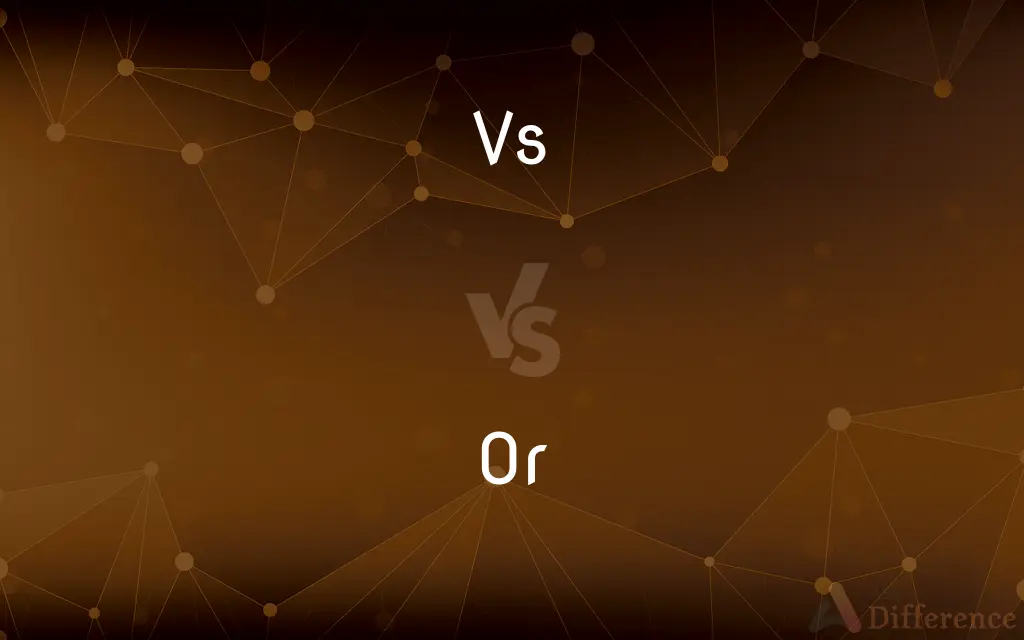Vs vs. Or — What's the Difference?
By Tayyaba Rehman & Urooj Arif — Published on February 6, 2024
"Vs" signifies competition or comparison between options, while "Or" presents alternatives or choices without implying competition.

Difference Between Vs and Or
Table of Contents
ADVERTISEMENT
Key Differences
"Vs" is a conjunction primarily used to denote opposition, comparison, or a choice between distinct, often competing, entities. It is widely used in legal contexts, sports, and any scenario where two sides are pitted against each other. On the other hand, "Or" is a coordinating conjunction used to connect alternatives or possibilities. It does not inherently imply a competitive relationship but rather presents options from which one can be chosen.
In usage, "Vs" tends to create a scenario where the entities involved are in direct confrontation or comparison, suggesting a conflict or a need to choose one over the other after evaluation. It's common in debates, legal battles, or sports where two teams face off. Conversely, "Or" offers a more relaxed choice, often without the pressure of competition. It's the conjunction you use when the choice is genuinely open, and there’s no underlying tone of one being pitted against the other.
The context in which "Vs" and "Or" are used can greatly affect their interpretation. "Vs" is prevalent in contexts where the outcome is zero-sum, meaning one entity's gain is inherently the other's loss. Legal cases, competitive sports, and product comparisons are prime examples. In contrast, "Or" is more inclusive and is used in everyday decisions and scenarios where the choice does not involve winning or losing but simply deciding between different options or paths.
Grammatically, "Vs" is often used in titles, headings, or where brevity is essential, and it's understood that two entities are being compared or contrasted. "Or," however, is a fundamental part of regular sentence structure, offering alternatives within a sentence without the brevity or formality often associated with "Vs." It's more conversational and less about pitting one option against another.
In summary, while "Vs" is about setting up a relationship of opposition or comparison, often in a more formal or structured context, "Or" is about presenting alternatives or choices in a more casual, open-ended manner. Understanding the context and connotation of each can help in choosing the appropriate word for a given situation.
ADVERTISEMENT
Comparison Chart
Connotation
Competitive, confrontational.
Neutral, offering a choice without pressure.
Usage Context
Legal cases, sports, debates.
Everyday decisions, casual choices.
Grammatical Role
Often used in titles, formal comparisons.
Used in regular sentence structure.
Implication
Zero-sum, one option overrides the other.
Inclusive, any option is acceptable.
Tone
Formal, structured.
Casual, conversational.
Compare with Definitions
Vs
Comparisons
The study compared the efficiency of method X vs. method Y.
Or
Possibility
Is she not coming, or is she just late?
Vs
Legal Disputes
The case of Brown vs. Board of Education was historic.
Or
Consequence
Finish your homework, or you'll lose your playtime.
Vs
Competition
The championship game tonight is Team A vs. Team B.
Or
Choice
You can stay here or come with us.
Vs
Contrast
The debate on nature vs. nurture continues.
Or
Clarification
Two cups, or perhaps three?
Vs
Preferences
It's a tough choice between vanilla vs. chocolate.
Or
Alternative
Do you want tea or coffee?
Vs
Alternative form of vs.
Or
Used to indicate an alternative, usually only before the last term of a series
Hot or cold.
This, that, or the other.
Vs
Obsolete typography of us
Or
Used to indicate the second of two alternatives, the first being preceded by either or whether
Your answer is either ingenious or wrong. I didn't know whether to laugh or cry.
Vs
Plural of v
Or
(Archaic) Used to indicate the first of two alternatives, with the force of either or whether.
Or
Used to indicate a synonymous or equivalent expression
Acrophobia, or fear of great heights.
Or
Used to indicate uncertainty or indefiniteness
Two or three.
Or
Before. Followed by ever or ere
"I doubt he will be dead or ere I come" (Shakespeare).
Or
A logical operator that returns a true value if one or both operands are true.
Or
Gold, represented in heraldic engraving by a white field sprinkled with small dots.
Or
Before.
Or
(logic) An operator denoting the disjunction of two propositions or truth values. There are two forms, the inclusive or and the exclusive or.
Or
Otherwise a consequence of the condition that the previous is false.
It's raining! Come inside or you'll catch a cold!
Or
(tincture) The gold or yellow tincture on a coat of arms.
Or
(tincture) Of gold or yellow tincture on a coat of arms.
Or
(obsolete) Early (on).
Or
(obsolete) Earlier, previously.
Or
Before; ere. Followed by "ever" or "ere".
Or
A particle that marks an alternative; as, you may read or may write, - that is, you may do one of the things at your pleasure, but not both. It corresponds to either. You may ride either to London or to Windsor. It often connects a series of words or propositions, presenting a choice of either; as, he may study law, or medicine, or divinity, or he may enter into trade.
If man's convenience, health,Or safety interfere, his rights and claimsAre paramount.
Maugre thine heed, thou must for indigenceOr steal, or beg, or borrow thy dispence.
Or
Ere; before; sooner than.
But natheless, while I have time and space,Or that I forther in this tale pace.
Or
Yellow or gold color, - represented in drawing or engraving by small dots.
Or
A state in northwestern United States on the Pacific
Or
A room in a hospital equipped for the performance of surgical operations;
Great care is taken to keep the operating rooms aseptic
Common Curiosities
What does "Vs" stand for?
"Vs" stands for "versus," indicating a comparison or competition.
Can "Vs" be used to compare similar things?
Yes, "Vs" can compare similar or dissimilar items, emphasizing their differences or competitive aspects.
Can "Or" imply a consequence?
Yes, "Or" can be used to present a consequence as an alternative, like "Do this, or face the consequences."
Is "Vs" used in written, spoken, or both forms of communication?
"Vs" is used in both but is more common in written form, especially in titles or formal documents.
How is "Vs" perceived in a sentence?
"Vs" is often perceived as setting up a conflict or direct comparison, with a formal or structured tone.
Does "Or" suggest a preference between options?
No, "Or" neutrally presents options without indicating a preference.
Is "Or" always used to offer a choice?
Primarily, yes. "Or" presents alternatives or possibilities, without implying a competition.
Is "Or" formal or casual?
"Or" is versatile and can be used both in formal and casual contexts, depending on the sentence.
Can "Vs" be used outside of legal or sports contexts?
Yes, "Vs" can be used to denote any form of comparison or contrast between two entities.
How does "Or" affect the tone of a sentence?
"Or" typically makes a sentence sound more open-ended and inclusive, offering choices without pressure.
Can "Vs" be used in informal settings?
While less common, "Vs" can be used informally to denote a playful or casual comparison.
How is "Vs" used in legal contexts?
In legal contexts, "Vs" denotes the adversarial relationship between the parties involved in a case.
Can "Or" link more than two options?
Yes, "Or" can link multiple options in a list, like "Option A, B, or C."
Is "Or" used in negative sentences?
Yes, "Or" can be used in negative sentences to offer alternatives or indicate possible outcomes.
Does the use of "Vs" imply a winner or loser?
In competitive contexts, yes, "Vs" often implies that one side will prevail over the other.
Share Your Discovery

Previous Comparison
Gantt Chart vs. Milestone Chart
Next Comparison
Hardwood Flooring vs. Engineered Wood FlooringAuthor Spotlight
Written by
Tayyaba RehmanTayyaba Rehman is a distinguished writer, currently serving as a primary contributor to askdifference.com. As a researcher in semantics and etymology, Tayyaba's passion for the complexity of languages and their distinctions has found a perfect home on the platform. Tayyaba delves into the intricacies of language, distinguishing between commonly confused words and phrases, thereby providing clarity for readers worldwide.
Co-written by
Urooj ArifUrooj is a skilled content writer at Ask Difference, known for her exceptional ability to simplify complex topics into engaging and informative content. With a passion for research and a flair for clear, concise writing, she consistently delivers articles that resonate with our diverse audience.













































